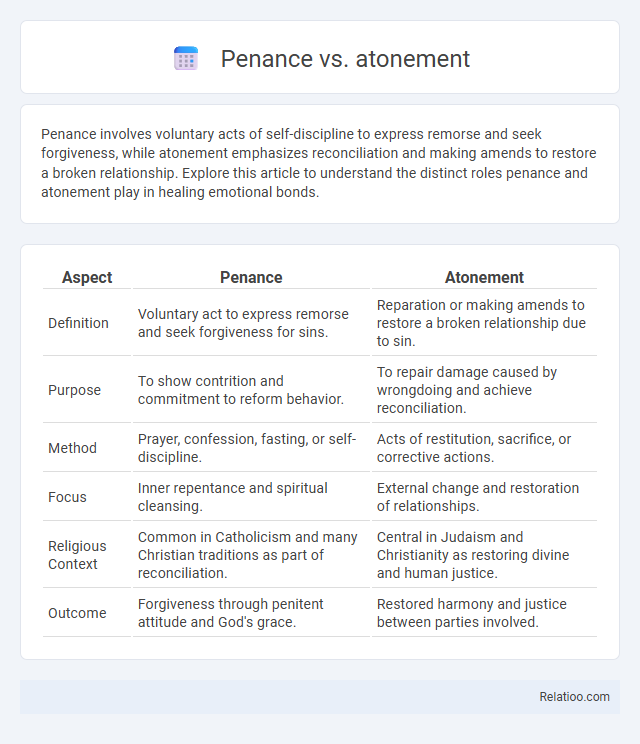Penance involves voluntary acts of self-discipline to express remorse and seek forgiveness, while atonement emphasizes reconciliation and making amends to restore a broken relationship. Explore this article to understand the distinct roles penance and atonement play in healing emotional bonds.
Table of Comparison
| Aspect | Penance | Atonement |
|---|---|---|
| Definition | Voluntary act to express remorse and seek forgiveness for sins. | Reparation or making amends to restore a broken relationship due to sin. |
| Purpose | To show contrition and commitment to reform behavior. | To repair damage caused by wrongdoing and achieve reconciliation. |
| Method | Prayer, confession, fasting, or self-discipline. | Acts of restitution, sacrifice, or corrective actions. |
| Focus | Inner repentance and spiritual cleansing. | External change and restoration of relationships. |
| Religious Context | Common in Catholicism and many Christian traditions as part of reconciliation. | Central in Judaism and Christianity as restoring divine and human justice. |
| Outcome | Forgiveness through penitent attitude and God's grace. | Restored harmony and justice between parties involved. |
Understanding the Concepts: Penance and Atonement
Penance involves voluntary acts of repentance or self-discipline to express sorrow for sins, often practiced in religious contexts as a form of spiritual purification. Atonement refers to the process of making amends or reparation for wrongdoing, emphasizing restoration of relationships and moral reconciliation. Understanding penance centers on personal responsibility and sacrifice, while atonement focuses on healing and restoring harmony between individuals or between humans and the divine.
Etymology and Historical Background
Penance, derived from the Latin "paenitentia," originally referred to feelings of repentance and remorse for sins within early Christian practices. Atonement, from the 16th-century English term meaning "at-one-ment," signifies reconciliation or making amends, especially in theological contexts related to Christ's sacrificial role. Historically, penance evolved as a ritualized act of repentance in the Catholic Church, while atonement emerged as a broader doctrinal concept encompassing forgiveness and restoration between humanity and the divine.
Key Differences Between Penance and Atonement
Penance involves voluntary acts of repentance and self-discipline to express remorse for sins, often including prayers, fasting, or confessions, serving as a personal remedy for spiritual faults. Atonement refers to the broader theological concept of reconciling with God by repairing the harm caused by sin, typically emphasizing the role of divine forgiveness and the restoration of a broken relationship. The key difference lies in penance being a human-initiated process of making amends, while atonement encompasses the divine process of grace and redemption that ultimately restores spiritual harmony.
Religious Perspectives on Penance
Religious perspectives on penance emphasize it as a sacrament or practice aimed at expressing repentance and seeking forgiveness for sins, often through prayer, confession, and acts of contrition. Penance differs from atonement, which generally refers to the reconciliation between humanity and the divine, achieved through Jesus Christ's sacrifice in Christianity or through repentance and restitution in other faiths. Your spiritual growth may be deepened by understanding penance's role in cleansing the soul and restoring a right relationship with God within various religious traditions.
Religious Interpretations of Atonement
Penance involves acts of repentance and self-punishment to express remorse for sins, often practiced in Catholicism as a path to spiritual healing. Atonement in Christian theology signifies reconciling humanity with God, chiefly through Jesus Christ's sacrificial death, emphasizing divine mercy and forgiveness. In Judaism, atonement is linked to Yom Kippur rites, involving repentance and seeking God's pardon to restore moral and spiritual purity.
Penance in Modern Practices
Penance involves specific acts of repentance often prescribed by religious traditions to express remorse and seek forgiveness, playing a vital role in modern spiritual practices. Unlike atonement, which broadly refers to the reconciliation between humanity and the divine, penance requires intentional actions such as prayer, fasting, or charitable deeds to demonstrate genuine repentance. Your engagement in penance today can foster personal growth, enhance moral accountability, and strengthen your connection to faith communities.
Atonement in Contemporary Contexts
Atonement in contemporary contexts emphasizes reconciliation and healing over ritual sacrifice, often linking personal accountability with social justice efforts. Unlike penance, which centers on acts of repentance and self-punishment, atonement involves transformative actions that restore relationships and address systemic harm. This shift reflects broader cultural movements toward restorative practices and collective responsibility in ethics and spirituality.
Psychological and Emotional Aspects
Penance involves voluntary actions to express remorse and can provide psychological relief by fostering a sense of control over guilt. Atonement centers on making amends or seeking forgiveness, which helps your emotional healing by restoring self-worth and repairing relationships. Both practices engage emotional processing but differ as penance emphasizes personal responsibility, while atonement highlights reconciliation and emotional restoration.
Penance vs Atonement in Literature and Culture
Penance and atonement, while often linked in literature and culture, hold distinct meanings--penance involves voluntary acts of repentance to express remorse and seek forgiveness, whereas atonement signifies the reconciliation of wrongdoing, restoring moral balance. Literary works like Dostoevsky's "Crime and Punishment" explore penance through characters' internal struggles, while atonement is central in narratives such as Ian McEwan's "Atonement," highlighting the transformative power of confession and restitution. Your understanding of these concepts deepens by examining their symbolic roles across cultures, where penance is action-driven and atonement reflects a holistic spiritual or ethical resolution.
Choosing the Path: When to Seek Penance or Atonement
Choosing between penance and atonement depends on the nature of your wrongdoing and the desired spiritual outcome. Penance typically involves acts of self-discipline or restitution to express remorse and seek forgiveness, while atonement signifies a deeper reconciliation process aiming to repair relationships and restore moral balance. Understanding when to pursue penance or atonement helps guide your path toward healing and spiritual restoration.

Infographic: Penance vs Atonement
 relatioo.com
relatioo.com